Location
Our Washington Location
Our inpatient facility is located in Washington, and will serve Washington state. It will provide a safe & therapeutic environment for both our staff and patients.
- Edmonds
7416 212th St SW,
Edmonds, WA 98026

Washington residents with a drug or alcohol addiction can find addiction resources in Oak Harbor. It's no secret that the alcohol and drug addiction epidemic has reached Washington. It's had a devastating impact in this state.
In 2015, 718 residents in Washington died from an opioid overdose. This doesn't even include all of the other substances being abused in this state. Residents abuse prescription drugs and illicit drugs.
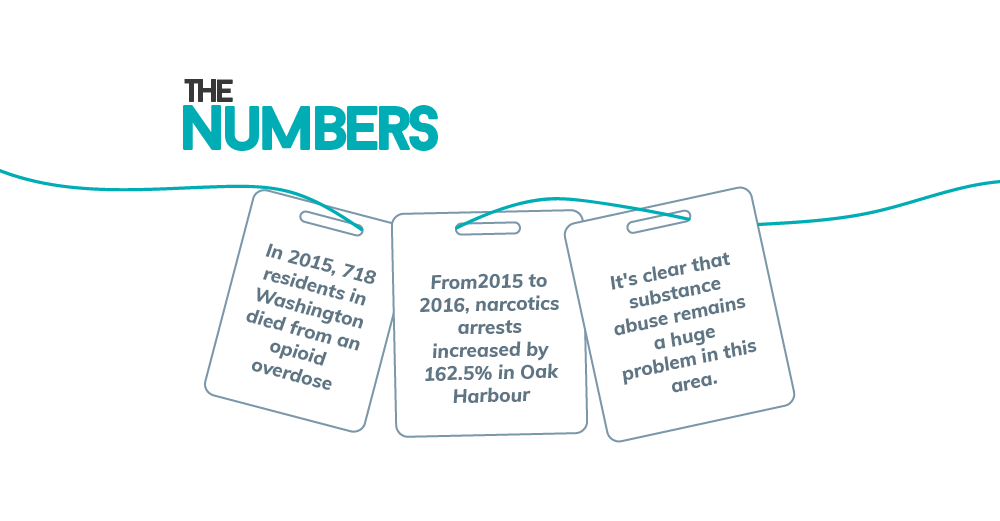
While all cities in Washington have been impacted by substance abuse, addiction rates have skyrocketed the most in Oak Harbor. It's possible to witness the effects of substance abuse everywhere in this city.
From 2015 to 2016, narcotics arrests have increased significantly in Island County. However, the most significant increase was in Oak Harbor. Narcotics arrests have increased by 162.5%. It's clear that substance abuse remains a huge problem in this area.
Oak Harbor is located in Island County. It is named after the Garry Oak trees that are found in the area. In general, Oak Harbor is a beautiful place to live.
To deal with the growing addiction problem in this area, many drug rehab facilities, support meetings and addiction resources have popped up in the area. It's easy for drug abusers and alcohol abusers to find the help they need. They don't have to look very hard.
If you or someone you know is struggling with addiction, we're here to help. We've compiled some information on the various addiction resources available in Oak Harbor within this guide. Take a look at the different options and tools that are at your disposal.
One of the best ways that an addict or alcoholic can get help is through an alcohol or drug treatment center. Each rehab facility will offer treatment plans that have a different level of care.
Some treatment programs provide 24/7 support and medical care to patients. These programs are ideal for patients who struggle with getting clean. They may need additional support in order to avoid relapses. Relapses are a normal part of the addiction cycle.
Other programs offer less support, but more flexibility and freedom. Some patients, like addicted parents, may benefit from more flexibility.
“There are approximately 12,000 drug and alcohol rehab programs available nationwide. Of those, about 10% are inpatient treatment centers, and another 80% are outpatient programs. The remaining 10% are methadone detox clinics and state-run programs funded by Medicaid.”
Each rehab center will also specialize in different areas. Some rehab facilities specialize in behavioral therapy, like Cognitive Behavioral Therapy, while others may specialize in dual diagnosis treatment.
Regardless of what you need to get sober, the first thing you must consider is whether you'd benefit more from an inpatient or outpatient center. These two levels of care are the most common options offered. We'll take a look at the unique features and characteristics of both. Understanding the structure of each of these programs will allow you to make a more informed decision.
Inpatient rehab centers are also known as residential centers. These rehab facilities require patients to move into the treatment center. There are no inpatient treatment programs in Oak Harbor although there are quite a few facilities in nearby cities.
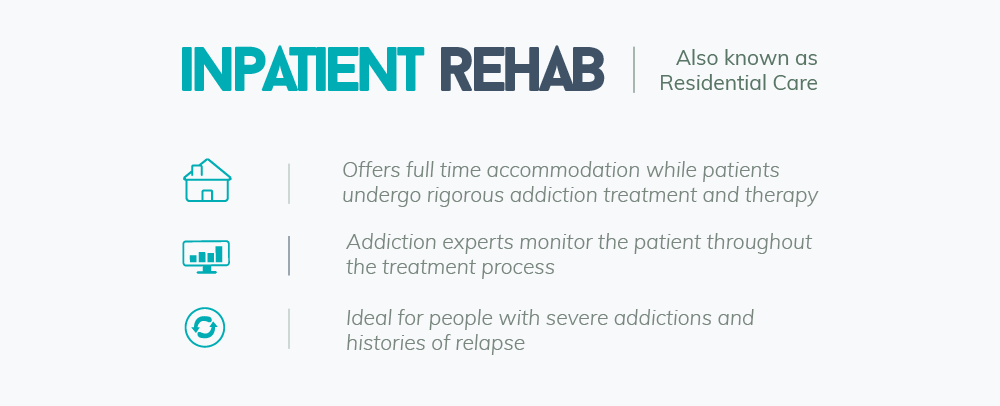
Most inpatient treatment programs take anywhere from 28 to 90 days to complete. Those who opt for a longer treatment length will usually have more success. The longer that they stay in the treatment, the more time that their brain and body have to reset. It can take some time for neurochemical levels to return to normal. An addiction can cause chemical levels within the body to become completely out of whack.
This type of treatment can be quite intense. Those who choose these programs will need to take an extended leave of absence from work or school. With that said, these programs are highly recommended for those with a serious and severe addiction. It's also a great choice for those who are at risk of experiencing intense, or even deadly, withdrawal symptoms.
Many drug addicts and alcoholics will start off with an inpatient program. If they find that the program is too intense, they can transition to an outpatient treatment program.
Most inpatient programs will start off with a week of detox before moving onto other therapeutic modalities.
If you're interested in this type of treatment, make sure that you pack appropriately before heading off for treatment. Once you set foot in the rehab facility, you'll need to stay there until you've completed your treatment.
There are many benefits to choosing an inpatient drug rehab. As Northpoint Washington is an inpatient facility, we'd be remiss not to mention all of the benefits that these programs have to offer. Some of the many benefits of residential drug and alcohol rehabs include:
Most inpatient programs offer versatile programs. They offer both holistic treatment options and behavioral therapies. Patients can alter their programs to fit their needs.
Outpatient treatment programs are basically the complete opposite of residential programs. These programs don't require as much from patients. Most of the time, patients can schedule the treatment around their errands or their day.
With an outpatient program, patients don't need to live at the rehab facility. Instead, they can leave whenever they're finished with their session.
There are several different types of outpatient programs. Each type is characterized by the amount of commitment that patients must agree to. The most common types of outpatient programs include:
The different types of outpatient programs offer the same type of therapy. Their main differences lie in the amount of treatment patients must commit to. At this moment, there are no outpatient programs in Oak Harbor. However, there are many options in surrounding cities.
Although we're not an outpatient program, we offer outpatient treatment at some of our other locations. If you cannot commit to a residential inpatient treatment program, we highly recommend that you try an outpatient program.
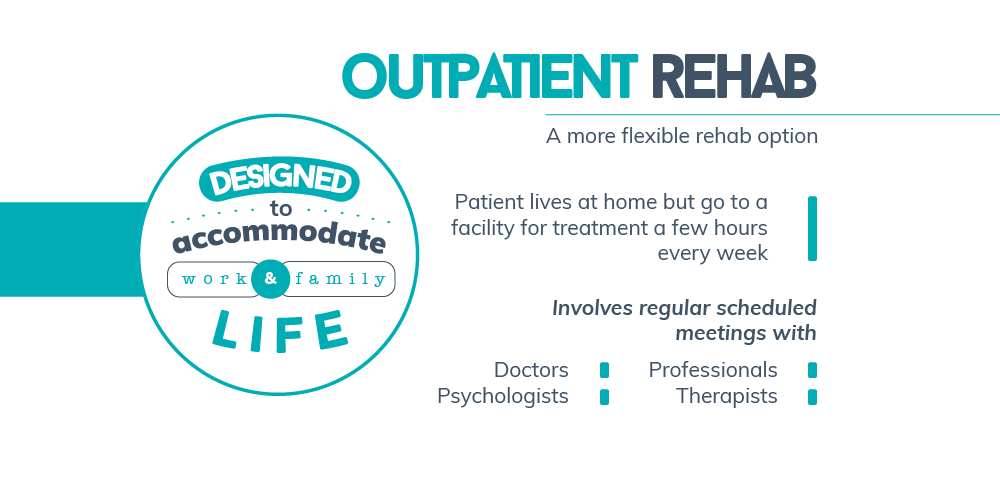
Outpatient programs can offer a wide variety of benefits. Some of the benefits of choosing an outpatient rehab program include:
Outpatient programs can be just as effective. Patients will usually need several months of treatment from an outpatient treatment center. Some patients may even choose to receive as much as a year of treatment from an outpatient program.
These programs are great for those with a lot of discipline or for those who only have a mild to moderate addiction. The withdrawal symptoms tend to be less overwhelming.
After completing a treatment program, recovering addicts are encouraged to continue an aftercare treatment plan. These plans are designed to prevent relapses. They help stabilize a recovering addict's life. It can take some time before addicts completely break free of the shackles of addiction.
The most common options to choose from include sober living homes or halfway homes. While these two are often mistaken for the same thing, they're completely different.

Halfway houses are usually living arrangements mandated by the court or an official. These places are designed for those who have a case against them or are part of a plea deal. Unfortunately, there are currently no halfway houses in Oak Harbor.
Sober living homes are quite different. Recovering addicts willingly sign up for these living arrangements. They pay rent to live in a home with other recovering addicts. These living arrangements require some participation. Residents will be responsible for certain chores. They'll also be expected to attend house meetings and recovery meetings. Some sober living homes will even have group therapy for residents.
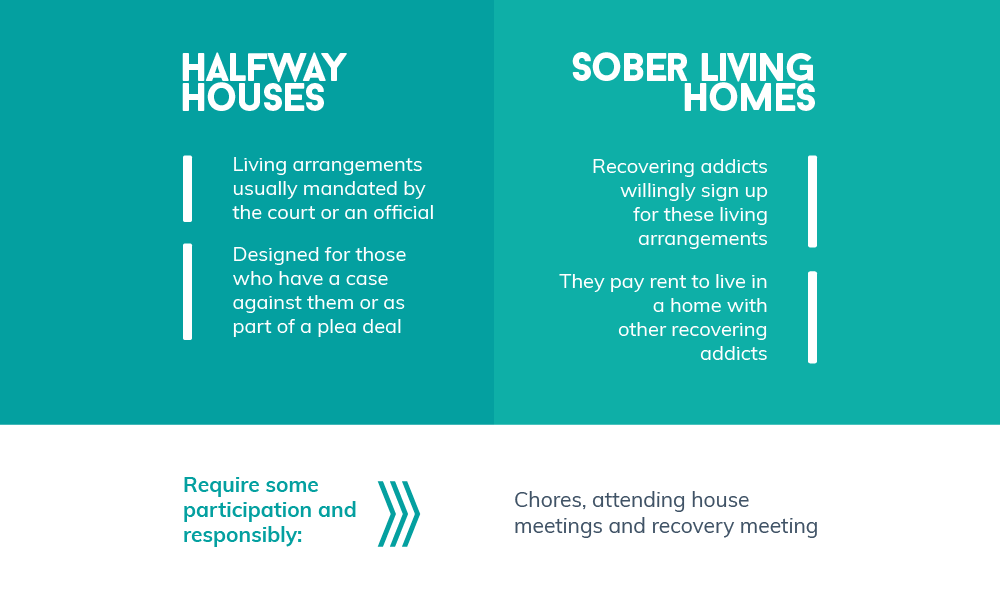
There are rules to living in a sober living home. Residents may not drink or do any drugs. They may expect random drug tests. Each home will have its own house rules. Residents who break these rules will be asked to leave.
As of this moment, there is one sober living home in Oak Harbor.
One of the main free addiction resources in Oak Harbor is support groups and recovery meetings. These usually include organizations, like Alcoholics Anonymous (AA), Narcotics Anonymous (NA), Al Anon and more. SMART (Self-Management and Recovery Training) meetings are also rising in popularity. They offer addicts a different meeting structure if the 12 step programs don't work for them.
These support groups offer not only social and emotional support, but also recovery tools needed to get sober. Members learn more about addiction and about themselves. They learn how to identify triggers and how to avoid relapses in a productive way.
Peer support is actually a lot more important than what most people think. It can be key to a successful recovery.
Fortunately, support groups and recovery meetings give like-minded individuals a chance to connect and bond. Substance abusers can vent about their feelings and their struggles with sobriety. These meetings provide a safe space for addicts to converse.
Being able to let all your inner struggles and frustrations off of your chest can make a bigger difference than you'd think. It can help ease psychological withdrawal symptoms. Many of these meetings will pair new members up with a mentor, or a sponsor. New members can call on their sponsors whenever they feel like they're in a rut.
Let's take a look at some of the more popular recovery meetings and addiction support groups in Oak Harbor below.
Alcoholics Anonymous (AA) is one of the first 12 step programs to ever be created. These programs follow twelve faith-based steps and principles. Those who follow these steps will acquire the tools needed to get sober and clean.
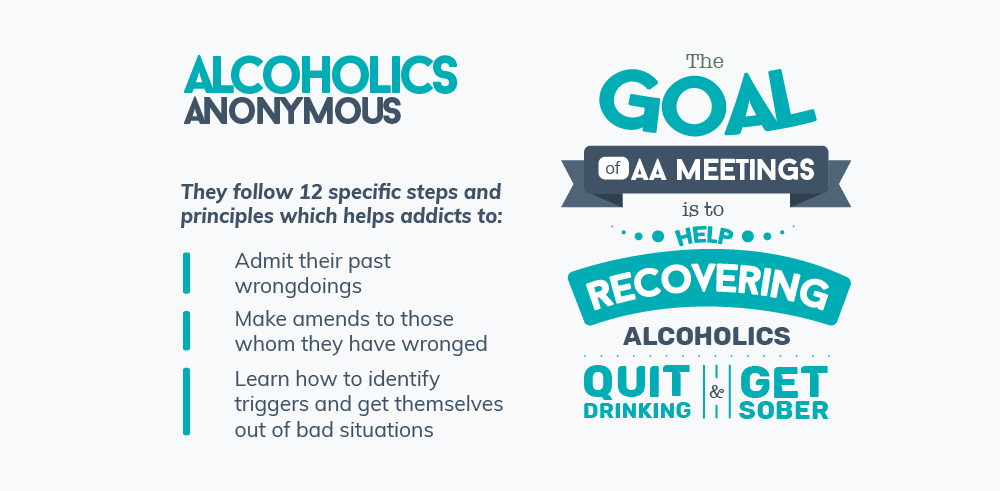
AA meetings were first founded in 1935 in Akron, Ohio. This organization has since expanded globally. There are meetings everywhere in the world, and in every city.
Recovering alcoholics will also find many AA meetings in Washington. Some AA meetings are gender-specific while others welcome people from all walks of life.
There are also open and closed meetings. Anyone can go to open meetings. In fact, it's possible to find counselors, addiction specialists, medical researchers and more at these meetings. In comparison, only recovering alcoholics can attend closed meetings. These meetings intend to provide recovering alcoholics a safe and private space to talk.
Meeting types will vary. Some meetings will focus on daily reflections. Others will focus on book studies, step studies, speaker discussions and more. All of these meetings work together to help get recovering alcoholics back on the right track.
There are quite a few AA meetings in Oak Harbor. If you're interested in attending one of these support groups, you can easily find a time and location that works for you.
Group name: Oak Harbor
Meeting time: 1:00 PM and 7:30 PM
Address: 350 NE 7th Ave
Group name: Oak Harbor
Meeting time: 12:00 PM and 7:30 PM
Address: 350 NE 7th Ave
Group name: Oak Harbor
Meeting time: 7:00 AM, 12:00 PM and 7:30 PM
Address: 350 NE 7th Ave
Group name: Oak Harbor for men only
Meeting time: 6:00 PM
Address: 350 NE 7th Ave
Group name: Blue Box
Meeting time: 7:30 PM
Address: 50 SW 6th Ave
Group name: Oak Harbor
Meeting time: 12:00 PM and 7:30 PM
Address: 350 NE 7th Ave
Group name: Fireside Group
Meeting time: 12:00 PM and 7:30 PM
Address: 350 NE 7th Ave
Group name: Oak Harbor
Meeting time: 7:00 AM, 12:00 PM and 7:30 PM
Address: 350 NE 7th Ave
Group name: Blue Box for women only
Meeting time: 6:30 PM
Address: 50 SW 6th Ave
Group name: Oak Harbor
Meeting time: 12:00 PM, 7:30 PM and 10:00 PM
Address: 350 NE 7th Ave
Group name: Blue Box
Meeting time: 7:30 PM
Address: 50 SW 6th Ave
Group name: Oak Harbor
Meeting time: 12:00 PM and 7:30 PM
Address: 350 NE 7th Ave
Narcotics Anonymous (NA) was founded in the 1940s. It's a branch of the Alcoholics Anonymous organization. The first meetings were held in California during the early 1950s. Like AA, NA is a 12-step program, but the meetings focus on all kinds of drugs and not just alcohol.
Much like with AA in Oak Harbor, there is no obligation to attend the meetings. Members also do not need to pay a fee. They only need to have a desire to get clean.
Anyone can attend a meeting in as long as it is an open meeting. At times, even non-addicts will attend. It's possible to find researchers, therapists, addiction specialists and loved ones of addicts at these meetings. Only recovering drug addicts are allowed access to closed meetings.
NA meetings have a similar structure to AA meetings. A leader, who is usually a recovering addict himself or herself, leads each meeting. Participants, then, introduce themselves and talk about their day or week. Those who feel uncomfortable speaking out can skip their turn to speak. These meetings are also known as daily reflections.
There are many other meeting types as well. In a speaker-type meeting, only one or two people will talk for the majority of the time. In step studies, everyone will study a single step and how to excel in that step.
There are a handful of NA meetings in Oak Harbor.
Group name: North Whidbey NA
Meeting time: 7:15 PM
Address: 1253 NW 2nd Ave.
Group name: North Whidbey NA
Meeting time: 7:15 PM
Address: 250 SW 3rd Ave.
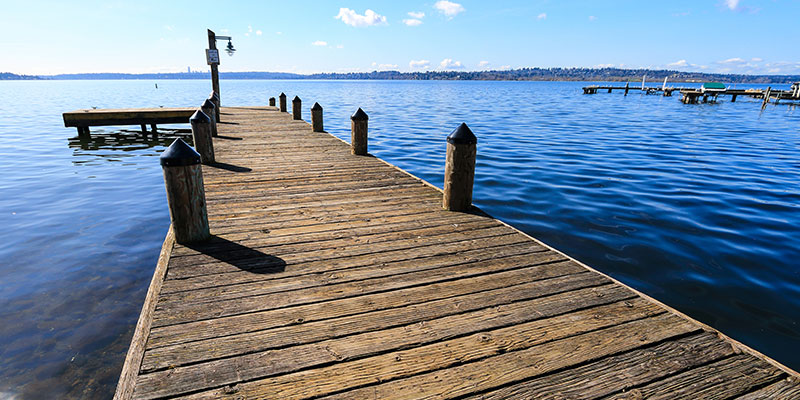
If you have a family member or a friend who is addicted to drugs or alcohol, there's a good chance that you're equally as affected by the addiction. You may waste a lot of your time trying to help someone get sober. If not, the addicted individual may lie to you or even steal your money to get their next fix.
Dealing with an addicted loved one is frustrating. Unfortunately, many loved ones hesitate to speak out or to get any support for their situation. After all, they're not the one with the addiction.
The truth is that loved ones often need the most support. They feel hopeless in the situation, as there's nothing that they can do to make the situation better. They have absolutely no control.
This is where Al Anon and Alateen meetings come in handy. Al Anon meetings are for anyone whose life has been affected by an addict. Alateen meetings are usually for teenagers with parents who are addicts. Both of these meetings give loved ones a platform to get the support they need.
Loved ones can share their frustrations and struggles with others who are in similar situations. They can learn how to better respond to various situations. More importantly, loved ones learn how to lead happy and healthy lives despite everything that's happening around them. They learn how to live independently from the addict, and how not to set themselves on fire in order to keep the addict warm.
It's possible to find Alateen and Al Anon meetings in Oak Harbor. At the current moment, there's only one in-person meeting.
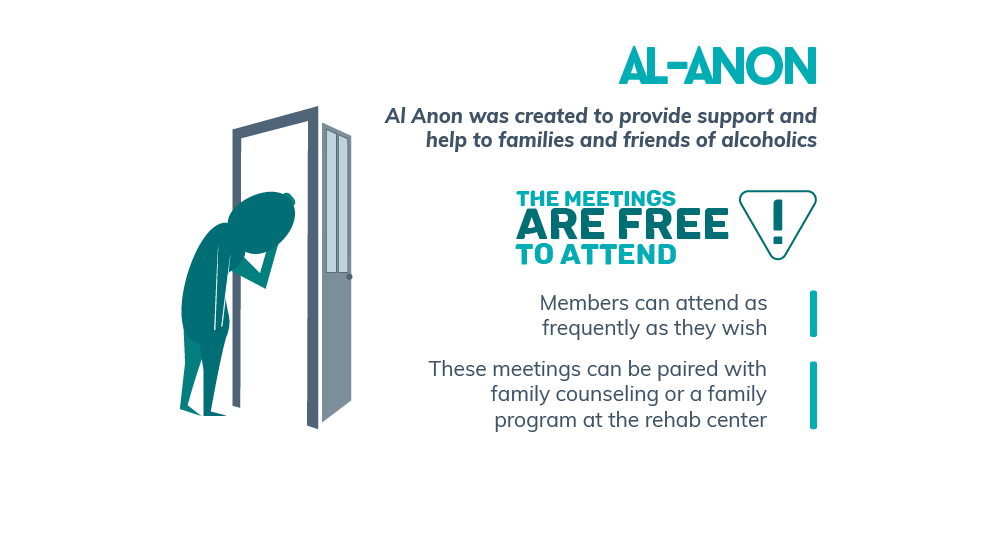
Group name: Lost And Found AFG
Meeting time: 7:30 PM
Address: 50 SW 6th Ave.
We understand that it can be difficult to make in-person Al Anon meetings. At times, it's simple impossible to get to these meetings or to schedule your day around them.
If an addict has affected your life and you need some extra support, you can also try online Al Anon meetings. These meetings are much more convenient. Anyone can access these meetings as long as they have an internet connection. This means that it's possible to attend an Al Anon meeting from anywhere. Some people may sit down with their laptop at a coffee shop, while others may cozy up to their computer at home.
There are also more Al Anon meetings hosted online than in-person. As a result, it's often easier to find a meeting that will work with your schedule. Some of the online Al Anon meetings available include:
These meetings work similarly to in-person meetings. Members discuss the same topics. Some people prefer online meetings, as they are able to stay anonymous.
SMART (Self-Management and Recovery Training) meetings are gaining popularity. These recovery meetings differ from 12 step programs, as they do not follow twelve steps or principles. These meetings are also not faith-based.
Instead, these meetings focus on teaching self-empowerment and self-reliance. They encourage recovering addicts to not only get clean, but also lead healthy and satisfying lives. These meetings provide recovering addicts with the tools they need to get clean. Most of the meetings are educational, with an open-discussion component.
SMART Recovery meetings are 4-point programs. The meetings are based on scientific knowledge. The four parts can be separated into:
These tools and techniques take a different approach in treating addiction. Recovering substance abusers can attend both SMART meetings and 12 step programs if they like.
Much like with 12 step programs, there are no obligations to attend meetings. Members can attend as frequently and infrequently as they wish. There are also both in-person and online meetings.
There are currently no SMART meetings in Oak Harbor. There are some in nearby cities, like:
Everett, Washington – Tuesday 2:00 PM to 3:00 PM
Everett Community Justice Center
8625 Evergreen Way, Suite 108, Everett, WA, 98221
Anacortes, Washington – Sunday 6:30 PM to 7:30 PM
Westminister Presbyterian Church
1300 9th. St., Classroom #5, Anacortes, WA 98221 USA
Burlington, Washington – Monday at 5:00 PM to 6:00 PM
Follman Agency
910 S Anacortes St., Burlington, Washington 98233, USA
These meetings welcome all types of addicts. It doesn't matter what type of substances that the addicts are hooked on.
Anyone who abuses drugs or alcohol puts himself or herself at risk of an overdose. This happens when a person takes too much of a certain substance. The drug or alcohol will overwhelm their body and mind.
Long time drug and alcohol abusers are more likely to experience an overdose. Their body has built tolerance to the substances being abused. As a result, they take larger and larger doses in order to get high. This means that they're more likely to take a dangerous dose.
At times, a dangerous dose may not be a lot. Fentanyl overdoses are increasing at alarming rates. This is mostly because only several micrograms of fentanyl is needed for an overdose. This type of overdose is incredibly deadly. The overdose victim will usually go into cardiac and respiratory depression and failure.
If you or someone you know abuses drugs or alcohol, it's important that you read up on what to do in the event of an overdose. Quick action may end up saving the overdose victim's life.
First and foremost, the one thing that you should do regardless of the type of substances being abused is to call 9-1-1. An overdose victim needs immediate medical attention.
Next, you should try to make the victim as comfortable as possible. If he or she is still conscious, try to gather as much information about the overdose as possible. This includes the type of substances ingested, the method of administration and more. If the overdose victim loses consciousness, place him or her in the recovery position. This will prevent them from choking on their own vomit.
Depending on whether the victim overdosed on a stimulant or a depressant, you should take different courses of action. Speak with the 9-1-1 operators for more information.
Naloxone is a medication capable of reversing opioid and opiate effects. It's an opioid antagonist, which means that it binds to opioid receptors and blocks opioid molecules. This medication is a lifesaver. It can restore normal breathing to an overdose victim.
If you or someone you know abuses opioids, like heroin or oxycodone, you absolutely must get your hands on a dose of naloxone. This prescription drug comes in two forms: an injection or a nasal spray. When injected, naloxone should work within 1 to 2 minutes. It'll take a little bit longer if it was administered via a nasal spray.
After administering naloxone, it's vital that you remember to perform CPR. This is a crucial step that many people forget to do after administering the medication.
It's also equally as important to call 9-1-1. The overdose victim still needs help. Naloxone will wear off in about 30 minutes. If there are still opioids or opiates in the victim's system, they are still at risk of overdosing.
It only takes about three minutes of oxygen deprivation for the neurons to sustain significant damage. If an overdose victim stops breathing for 5 minutes, they may die.
As with almost all things concerning an overdose, you must act quickly. There's no time to hesitate and to waver.
If you're worried about whether you can possess or administer Narcan, don't worry. Washington is one of the 39 states with a Collaborative Drug Therapy Agreement. This means that you can possess, obtain and administer naloxone to yourself or someone else, like a friend or a family member.
There are many ways that you can get your hands on this medication. Almost every emergency responder will carry this drug. Many police departments will also have some handy.
It's also possible to find naloxone at many outreach centers and drug rehab facilities. In fact, many outreach centers will give naloxone out to opioid outreach clients who are at risk of an overdose.
It's possible to also buy naloxone from pharmacies in Washington. You don't need a prescription. Most pharmacies will offer a brief consultation. A professional will walk you through the steps on how to administer and use naloxone for optimal efficacy.
You can find naloxone at chain pharmacies and private pharmacies. The chain pharmacies that carry naloxone can be found here. There are quite a few pharmacies in Oak Harbor that carry naloxone.
Two sprays of naloxone cost anywhere from $125 to $130. In Washington, pharmacies can bill your insurance plan, so you won't have to cover most of the cost. Most commercial plans will cover naloxone for a standard copay.
If you don't have private insurance, but have Medicaid, you're also in luck. This government health insurance plan for low-income families will also cover the cost of Narcan.
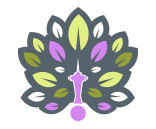
If you're struggling with any type of addiction, the addiction specialists at Northpoint Washington can help. We offer a wide variety of treatment programs to treat various substance abuse problems. We will also individually tailor each treatment plan to meet the needs of each patient.
Our facility offers inpatient treatment plans for both alcohol and drug addiction. We offer detox programs, and also an intensive outpatient program (IOP). Our staff will work with you to determine the type of plan that will work best for your situation.
Don't let addiction ruin your life. With the right help, it's possible to get sober and to lead a healthy and happy life.

Our admissions coordinators are here to help you get started with treatment the right way. They'll verify your health insurance, help set up travel arrangements, and make sure your transition into treatment is smooth and hassle-free.
[DirectNumber] Contact Us